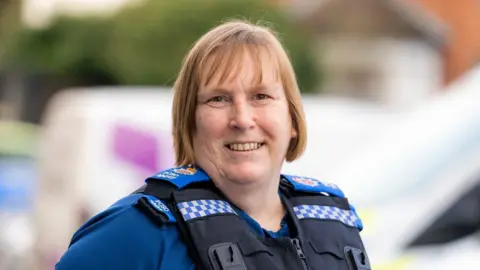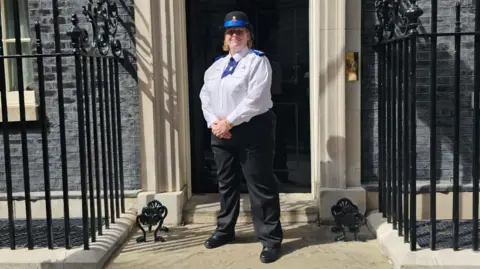BBC News, South East
 Surrey Police
Surrey PoliceA police community support officer (PCSO) has described how she was left traumatised after being strangled while on duty.
Just three months later, Chrissie Moyes – who has been a PCSO for 23 years – was attacked with a meat tenderiser in Guildford, Surrey.
Data obtained by the BBC from Sussex Police shows a 40% increase in assaults on PCSOs between 2020 and 2024, while Kent Police have recorded a 40% rise in assaults on emergency workers over the same period. Surrey Police said it could not provide the data due to how it records crime.
A Home Office spokesperson said: “Assault on a member of the police workforce is illegal, and those found guilty will face the full force of the law.”
In the coming months there would be 3,000 extra officers in neighbourhood policing teams, which would “ensure that not only our communities feel safer, but our officers do too,” they added.
‘I was choking’
Ms Moyes said she was attacked by a woman who was with a drunk and disorderly man under arrest.
“She was proper vile,” Ms Moyes told the BBC. “She grabbed me by my throat and went into a pincer movement.
“I was choking.”
As she struggled to get free, Ms Moyes said one colleague – another PCSO – managed to get the “extremely aggressive” woman off her.
“Luckily, someone saved me.”
But the PSCO, who was formerly in the army, said she was left feeling “really vulnerable”.
“I can’t go there without having flashbacks,” Ms Moyes added.
 Getty Images
Getty ImagesShe said back-up took “way too long” to arrive in what “felt like 40 minutes to an hour” because there were multiple ongoing serious incidents.
A shortage of personnel due to budget cuts under the previous government was to blame, Ms Moyes added.
The Conservative Party has been approached for comment.
“I have worked for my force for 23 years and love my job, however I’ve not seen such a lack of resources like we have now,” she told the BBC.
Social media moments
A spokesperson for the Public and Commercial Services Union said nothing could prepare PCSOs for the “level of hostility and violence” they can face on the beat.
But they added an uplift in recruitment and retention of both PCSOs and police constables could help ensure PCSOs were working alone less regularly – where they are more likely to be victims of assault – and improve response times when they request assistance.
A PCSO in Sussex was left with a broken nose after being punched several times in the face while working solo in May.
He was aided by members of the public who helped detain the assailant while further police support arrived.
The union spokesperson said violence against PCSOs was fuelled by people seeking “social-media-worthy” moments, where police staff are antagonised to try and get them to do or say something wrong for footage to share online.
Physical assaults can cause mental trauma, which may lead PCSOs to quit their jobs, they added.
 Chrissie Moyes
Chrissie MoyesMs Moyes said in her opinion PCSOs could have a “very different” experience from a police officer when their attackers went through court.
“It’s about being treated equally,” she added, detailing she was disappointed with the outcome delivered by the courts.
‘Pink and fluffy’
Part of the problem, Ms Moyes said, was the public viewed PCSOs differently from police officers since they typically do not have the same powers or equipment, such as handcuffs or pepper spray.
“We get called plastic,” she said. “Pink and fluffy. Wannabe gaffers.”
But she added PCSOs did community work, such as tackling anti-social behaviour, which would be unnecessary and overly costly for police constables to respond to.
She also thought it was important for PCSOs to remain like civilians to “break down the barriers of uniform” and gain people’s trust.
“There needs to be more respect to policing in general,” Ms Moyes continued.
“It is one hard job.”

